 'Jin' named the word of the year by cross-strait netizens
'Jin' named the word of the year by cross-strait netizens Chinese scientific expedition goes to build new Antarctica station
Chinese scientific expedition goes to build new Antarctica station
 Chinese naval escort fleet conducts replenishment in Indian Ocean
Chinese naval escort fleet conducts replenishment in Indian Ocean 17th joint patrol of Mekong River to start
17th joint patrol of Mekong River to start China's moon rover, lander photograph each other
China's moon rover, lander photograph each other Teaming up against polluters
Teaming up against polluters
BEIJING, Dec. 30 -- Four days after Japanese Prime Minister Shinzo Abe's visit to the controversial Yasukuni Shrine, disappointment and condemnation over his reckless move are still mounting.
Singapore on Sunday expressed its regrets over Abe's visit, fearing that his act "is likely to evoke further negative feelings and reactions in the region."
"Our consistent position has been that such visits reopen old grievances, and are unhelpful to building trust and confidence in the region," a Foreign Ministry spokesman said.
"It is in the interest of all parties to exercise restraint, avoid actions which might further raise tensions, and seek to create an environment of greater mutual trust and understanding," the spokesman said.
Meanwhile, neighboring countries such as China and South Korea, who suffered greatly from Japan's invasion and colonization during World War II, continued to denounce Abe's visit.
The Washington branch of the China Council for the Promotion of Peaceful National Reunification on Saturday strongly condemned Abe's visit in a statement, warning him "those who play with fire will get burnt."
The statement said Abe had blatantly paid homage as a sitting prime minister to a shrine, where Class-A war criminals from WWII were honored. His act totally ignored historical justice and human conscience and presumptuously challenged the post-WWII international order based on the UN Charter, it said.
Zhou Guangming, president of the Council's Australian branch, told Xinhua Sunday that Abe's visit damaged world peace and intensified regional tension in East Asia.
In another development, South Korean President Park Geun-hye appeared to criticize Japan on Monday for "digging up wounds of the past," the Yonhap News Agency reported.
"In the new year ... I hope that there will be no act of letting trust between countries crash and people's feelings deteriorate by digging up wounds of the past," the news service quoted Park as saying, adding her remark was apparently directed at Japan, though she did not mention it by name.
Abe's visit also raised concerns inside Japan.
Japanese Kyodo News Agency on Sunday published the result of a nationwide telephone survey, showing that nearly 70 percent of respondents said Abe should heed the diplomatic implications of his visit to the shrine.
"Japan faces an uncertain future in its relations with other countries in 2014 after Abe's surprise visit drew a cold response from key global players, such as China and the United States, and risked Japan's isolation," said the news service in another editorial. It feared improving ties with China and South Korea appeared harder than ever now.
Kazuhiko Togo, a former senior Japanese diplomat and Director at Kyoto Sangyo University's Institute for World Affairs also voiced concern.
"To those who are general supporters of Abe's economic, political and foreign policy initiatives, including myself, his visit to Yasukuni Shrine on Dec. 26 was a bombshell of disappointment and helplessness," he wrote in a bylined column published Sunday on the East Asia Forum website.
With the visit, Abe had succeeded at one fell swoop in creating an encirclement of Japan by China, South Korea and Russia, he argued, fearing the list may extend to countries throughout the Asia Pacific and Europe.
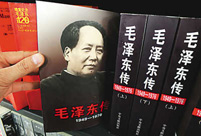 Commemorate 120th birth anniversary of Mao Zedong
Commemorate 120th birth anniversary of Mao Zedong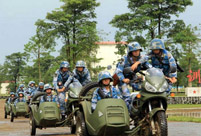 Female soldiers of PLA Marine Corps in training
Female soldiers of PLA Marine Corps in training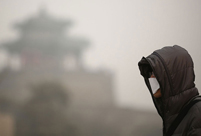 Chinese cities to have a very grey Christmas as smog persists
Chinese cities to have a very grey Christmas as smog persists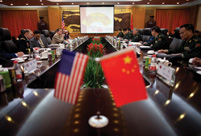 China and U.S. - the national image in each other’s eyes
China and U.S. - the national image in each other’s eyes The Liaoning's combat capability tested in sea trial
The Liaoning's combat capability tested in sea trial Chinese pole dancing team show their moves in snow
Chinese pole dancing team show their moves in snow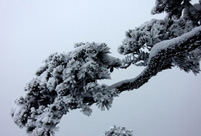 Rime scenery in Mount Huangshan
Rime scenery in Mount Huangshan Ronnie O'Sullivan: My children mean the world to me
Ronnie O'Sullivan: My children mean the world to me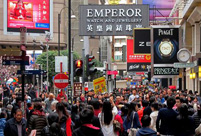 Shopping in Hong Kong: a different picture
Shopping in Hong Kong: a different picture Red crabs begin annual migrations in Australia
Red crabs begin annual migrations in Australia Fleet hits targets in training
Fleet hits targets in training Mother practices Taiji with her son
Mother practices Taiji with her son  Crashed French helicopter salvaged
Crashed French helicopter salvaged Winter travels in Anhui
Winter travels in Anhui  Bird show opens to public in Calcutta, India
Bird show opens to public in Calcutta, IndiaDay|Week|Month